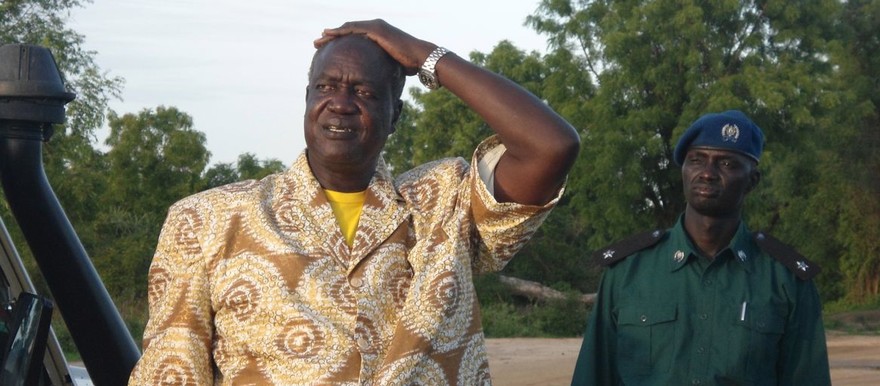SPLM, the ruling party of South Sudan, has fractured since the start of a civil war in December 2013. The faction of the party based in Juba remains under the leadership of President Salva Kiir.
The SPLM-Juba faction controls the cabinet, the presidency, a remnant of the SPLA, and several governorships. In a series of articles, Radio Tamazuj profiles some key party members who have remained loyal to Salva Kiir since the start of the crisis.
Factbox: Kuol Manyang Juuk
Kuol Manyang Juuk is a South Sudanese politician. He was born in 1945 in Mathiang village, located about 25 kilometers northeast of Bor town, capital of Jonglei state. He comes from Pathoyeth clan, a well-known warrior section in Dinka Bor from Agok lineage.
His mother, Keth Kuereng, comes from Adol clan from the southern parts of Bor town. His grandfather, Juuk, was widely known in the area for possessing many cows and he had several wives. Because of the wealth at the disposal of Kuol’s parents, his father, Manyang, is said to have not initially shown interest in sending him to school as some of his peers did.
At the time, boys who were expected to inherit wealth were often kept close to the parents, whereas boys who could not expect to inherit much were sent away to school. In spite of this, Kuol’s uncle Mayol Juuk Chaw insisted he go to school together with his peers. It was after this discussion within the family that he was allowed to go Malakal town, capital of Upper Nile, where he pursued his elementary and intermediate education at the branch of Bor primary school.
Malakal was the provincial headquarters of Greater Upper Nile region at the time. After studying there, he went to Khartoum for secondary education at Khartoum Vocational Training Centre, where he was awarded a diploma in engineering, earning him employment in Wed Madeni, Gezira state, in central Sudan, as a vocational inspector at the center.
His performance at the center later made it possible for him to go to East Germany for studies at one of the technical institutes in Magdeburg for two years, covering 1975-77, where he earned another diploma in engineering.
Juuk was appointed instructor at a vocational training centre in Wau in 1977 following his return from East Germany. He later moved to Juba in 1978 where he worked as deputy manager at the Multipurpose Training Centre (MTC) until December 1983 when he decided to rebel against the Sudanese government and joined the Sudan People’s Liberation Movement (SPLM).
He went to Bilpam, Ethiopia, where he was trained and passed out from the military training with the rank of major due his performance at the training. Upon completing military training he was appointed to a position at the headquarters, before going to Bonga where he studied war and revolution studies in 1985.
He later became zonal commander covering the central sector straddling areas stretching into the present day Lakes state in Bahr el Ghazal region and the present day Jonglei state in Upper Nile region, in around 1988.
He also became a provisional member of the SPLM/A military high command before being appointed as commander of the Bright Star campaign.
Within the SPLM/A, Kuol was seen as close to the founding leader John Garang de Mabior, but fell out with the third in command William Nyuon Bany, who defected in 1992 claiming Kuol was undermining him and complaining that Garang would not take any disciplinary action against him.
In the aftermath of commander Bany’s defection Kuol became deputy chief of general staff of the SPLA forces in 1993 and became member of the liberation council and governor of Upper Nile region in 1994.
He was later replaced by Commander John Koang Nyuon and became commissioner of finance and economic planning, a position he held until the Comprehensive Peace Agreement was signed in 2005, whereupon he was appointed as caretaker governor of Northern Bahr el Ghazal State.
He served there until appointed minister of roads and transport in Sudan’s national unity government, a position he also held until his appointment in December 2007 as governor of Jonglei State, replacing Philip Thon Leek.
In Bor town in 2008 he was selected at the party congress as the chairman of the Sudan People’s Liberation Movement branch in Jonglei state, with Hussein Maar Nyuot becoming his deputy at the time. He won the endorsement of the SPLM Political Bureau to run for election as governor of Jonglei in the 2010 general elections.
Results of the election were announced in his favor, but his main rival, General George Athor, claimed rigging and launched a rebellion. Athor was later killed in 2011 under unclear circumstances.
Kuol Manyang continued to serve as governor until he was appointed in 2013 as minister of defense. Besides holding this position, he remains the head of the SPLM branch office in Jonglei and continues to hold membership in the SPLM Political Bureau.
He is seen as close to President Salva Kiir in part because of the role he played in the SPLM leadership’s decision in 2005 to place Salva Kiir in the chairmanship of the party. He also reportedly stood behind Kiir last year when other senior members of the party, including the SPLM vice chairman Riek Machar, showed interest in challenging Kiir for the chairmanship.
More in this series:
Who’s who of the SPLM-Juba faction: Kuel Aguer Kuel
Who’s who of the SPLM-Juba faction: Aleu Ayieny Aleu
Who’s who of the SPLM-Juba faction: James Wani Igga
Who’s who of the SPLM-Juba faction: Jemma Nunu Kumba
Who’s who of the SPLM-Juba faction: Telar Ring Deng




